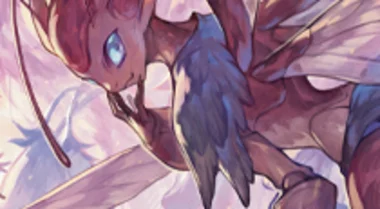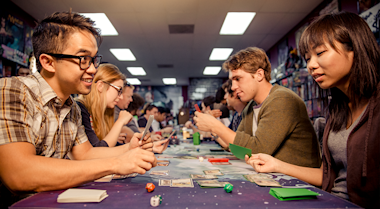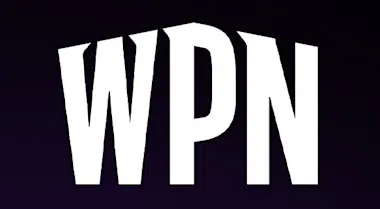Aug 29, 2020 — WPN Orientation, Events
WPN Orientation: Event Strategy
Review the basics on the WPN before your first conversation.
How you manage your event calendar has a direct impact on the effectiveness of your advertising strategies. This article dives into different promotion techniques you should consider when building your communication plan.
Review the Event Strategy checklist here:
This article will cover the following topics in more detail:
- Managing Your Event Calendar
- Managing Formats
- Prize Support Strategy
- Event Promotion
Managing Your Event Calendar
For any store running events, an event calendar is as important as a menu at a restaurant. This is one of the most important communication and advertising tools you have at your disposal, so taking care to maintain it and make it readable is essential. Here is our advice for a robust calendar.
The best calendars are (1) easy to find, (2) easy to read, and (3) consistent across platforms.
Easy to Find
Here are a few places we recommend keeping your calendar. If nothing else, keep it at eye level.
- Store window. Especially for stores in places with lots of walking traffic.
- Point of sale. Have a monthly calendar handy to give to customers as they make purchases.
- Play area. Keep your future events top-of-mind as they play in your regular events.
- Inside Welcome Decks. Slip a mini calendar featuring new player events into demo decks.
- Social Media. Engage your community in discussion about exciting future event opportunities.
- Website. Give it its own tab for people to reference.
- Bathroom Stalls. A posted calendar or other store-related information will help inform your customers and keep them occupied.
Easy to Read
Consider your calendar as a marketing tool that might reach beyond the customers you expect. Ensure that your calendar is informative and easy to read for all audiences, not just your regulars.
- No acronyms. New customers don’t know what “FNM" means. Spell event names out.
- Color coded. Information is easier to process with easy patterns. All draft events are green, etc.
- Essential information only. Don’t overcomplicate the event description. Include the name of the event, registration time, start time, format, cost.
- Clickability. If the calendar is digital, provide links to additional resources like a registration page, your Facebook page, or your website.
Consistent
Ensure your calendars are consistent across all platforms. Update every calendar whenever you schedule a new event in Wizards EventLink. Don’t risk that players will operate on inaccurate information.
Help your players establish a routine by offering the same event every week. Consistency is key for regular play. However, it’s okay to change things up by offering a rotating “special event" schedule on each week gives people a reason to check your calendar more often. Take feedback from your community for new event ideas, and to understand if your evergreen events are working as intended.
Managing Formats
There are a lot of ways to play Magic. In general, you’ll want to favor events that promote current products and the Standard format. This is to maximize accessibility, and to create opportunities for new or casual players to get involved in your organized play community.
There are many different formats, but you’ll quickly find that many players that play non-Standard formats are experienced players, and often know exactly what to ask you for. They don’t require much marketing effort to attract them to your events.
Focus on new and casual player growth, as that presents the greatest potential gain in your customer base.
The full Magic Tournament Rules (and other helpful documents) can be found here.
Limited Format Events
Limited events like Booster Draft and Sealed Deck have players open booster packs as part of the event, then they build their decks to compete against each other.
For all Limited events, you’ll be expected to have plenty of basic land cards available for your players. You can always ask your players to return the land cards to you when they’re done playing.
Booster Draft is one of the most popular formats, as it is easy to engage with the current set release and players often see this as an even playing field. Keep in mind that this format is more complicated and harder to navigate for new players, so we recommend directing players to this format after they’ve had some experience playing with constructed decks.
Learn more about Booster Draft here.
Sealed Deck is the format of Prereleases, where players are given six booster packs to open and play with. This is a very accessible format, especially when a player is brand new. They only need to understand the small selection of cards in front of them.
Learn more about Sealed Deck here.
Constructed Format Events
There are many constructed event formats for your players to enjoy, such as Modern and Commander, but to maximize accessibility it is important to have an event plan that focuses on cards from the latest sets.
Standard is a dynamic format where you build decks and play using cards in your collection from recently released Magic sets. Evolving gameplay and fresh strategies make it one of the most fun and popular ways to play Magic. Each year, four Magic sets are released and added to Standard. Once per year, when the fall set releases, the four oldest sets in Standard rotate out.
To learn more about what sets are in Standard, review this website..
Brawl is a little like Standard, a little like Commander, and a uniquely exciting deck-brewing challenge. Players build a deck around a legendary creature or planeswalker from the Standard card pool, and battle against friends in one-on-one or multiplayer free-for-all games.
Learn more about Brawl here.
Non-Format Events
It is also important to have events on your calendar that serve purposes other than traditional organized play. Your options here are infinite, but consider these objectives of alternative event offerings:
- To grow your community. Run a trading event or introduce players of other games to Magic by running them next to or alongside your Magic events.
- To teach or improve understanding. Run events like deckbuilding workshops or learn-to-draft events.
- To prepare players for tougher competition. Organize an open competitive play event so players can practice for upcoming tournaments.
Introducing New Events
Take a deep look at your play attendance and identify what might be missing. Are drafts not firing the way you’d like them to? Are you interested in diversifying your play options further? Here are some things to consider when bringing a new event or format to your players.
- Survey your players. What are your players are playing, and how often? What formats are they asking for? Is the prize support working for you and your players? Are all audiences being served?
- Find a champion. Appoint someone to take on the role of community leader for that event or format. A weekly event lives and dies by its community, so the leader should be a friendly, outgoing person to help attract new players and rally the player base to want to participate.
- Allow new formats time to grow. When you’re trying to introduce a new format to your players, it’s usually best to do it slowly. If you don’t think a format will fire every week, it’s okay to space it out. Try running the same event at the same time every week for two months to allow your players time to adjust their schedules and invite their friends.
- Get involved. Format growth also doesn’t happen without enthusiasm from the store, so be sure to build a deck in that format so you can play it with your community. Don’t engage in negative criticism of formats or events you are trying to promote.
Prize Support Strategy
What inspires a player to participate in your events? The answer will likely vary between players, regions, dates and times, and other factors. The one variable you have control over is your prize support offerings, and our best advice is to approach prize support strategically.
Events for New or Casual Players
New players need accessible formats to make it easy for them to join an event. When designing an event plan, consider what motivates a new or casual player to participate in your events.
Motivators:
- Accessibility
- Diversity of Play
- Fun
New players are not generally sensitive to rewards for play. For them, the reward is the experience of either playing the game or participating in your community. The same can be said for many casual players that tend to play infrequently or at home.
To maximize event appeal for these players, we advise the following approach.
- Flat Prize Structure. Prizes are distributed to either most players or all players evenly.
- No Top Prizes. Removing prize incentives for winning largely eliminates pressure of competition and allows the event to be focused more on the experience of play. Try running an event with no rounds or specific pairings and just let your players mingle.
- Creative Rewards. If other rewards exist, consider giving them to players for non-competition-based behaviors (Sportsmanship, being new to the game, bringing a friend, most creative deck, cool plays).
Events for Experienced Players
This player group is the most vocal, so they are the players you’ll hear the most from about their preferences. They are generally an easier group of players to work with.
Motivators:
- Specific Formats
- Challenging Play
- Big Rewards
Experienced players appreciate being able to play their preferred format regularly, with occasional opportunities to compete to win big prizes. They still play in events like Prereleases and Friday Night Magic, but if you offer events that cater specifically to the experienced players, you’ll help them find play opportunities with more challenging opponents.
To maximize event appeal for these players, we advise the following approach.
- Top-Heavy Prize Structure. Reward top players for winning tough tournaments.
- Predictability. Experienced players can spend weeks fine-tuning a deck to compete with, so they are more sensitive to the little changes in your events.
- Tighter Rules Enforcement. These players are generally sensitive to the official rules and like being rewarded for playing well. Rules leniency is good for store-level casual events, but for larger events with a lot on the line consider brushing up on the official Magic Tournament Rules.
Event Promotion
You have a calendar, you have a variety of events for players to enjoy, and you have appropriate prizes to reward them. Now you need to get those players in the door. We find it useful to break down your marketing efforts into three categories: in-store, out-of-store, and online. Have a strategy for each of these customer touch points and control your message.
In-Store Marketing
It goes without saying that you’ll want to advertise within the walls of your store. This will reach your existing customers, friends and relatives of those customers, and random walk-ins. Plan for how you’ll make it easy for customers to receive information about upcoming events and products.
- Point of Sale. Curate talking points so that you and your staff can promote upcoming events and products to customers as they are checking out. Consider a small printout with a specific call to action (like “Sign up now!") that can be easily read near your display.
- Posters and fliers. You can download and print large posters, fliers, achievement cards, checklists, registration sheets, and table numbers from our Marketing Materials page. Our team of Trade Marketing Specialists curate these materials for each set, so be sure to check back regularly to update your options.
- Take down old marketing assets. Older materials may be nostalgic for you, but they don’t often create as meaningful conversations as posters that advertise your newest inventory. Simplify your message and strengthen your marketing efforts.
- During your event. Before each event, take advantage of your captive audience by quickly mentioning future opportunities for your players. Keep your upcoming events top-of-mind and give them something to talk about while they play.
Out-of-Store Marketing
Advertising inside your store can only get you so far. Reach out to local schools, libraries, and other community outlets to reach audiences you wouldn't have otherwise. Review your local laws to see if this type of outreach is permissible.
- School outreach. Ensure your store is a safe place for kids to learn and play. If your local laws allow it, get in touch with your local schools and ask if they can help you broaden your message. Go here for tips from Stronghold Games on starting a school outreach program.
- Conventions. Look around for opportunities to host demonstrations for your games at local or regional conventions. Spread the word about your business and generate new interest.
- Community outreach. Get involved in your local community’s events. Sponsor a local sports team or invite your players to a community clean-up day.
- Paid advertising. We typically advise looking for free or cheaper marketing opportunities before you go for big expenditures. For more insights on paying for advertising, check out this article.
Marketing for the Web
It’s a no-brainer that your store should have social media presence. Just like with in-store advertising, it’s better to have a consistent strategy in place so you stay consistent, professional, and on-message.
- Use our digital marketing assets. Download web banners and animations from our collection of marketing materials to promote events on your store’s website and social media platforms.
- Measure success. Make sure your marketing is worth the effort by using tools to analyze and evaluate the success of your social media marketing.
- Highlight your community. A great way to promote your store’s events is to take photos (with your players’ permission) showcasing them. Celebrate the winners at your events by having them pose with their prizes or show off amazing decorations you put up for parties.
Top Takeaways
Have a healthy mix of events and promote them effectively. Here are our top talking points.
- Have a communication plan. The way you talk about events should be thorough and consistent.
- Your event calendar should be accessible. It's as important as a restaurant menu. Summarize your activities for all audiences.
- Understand how prize support influences event appeal. Different prizes motivate different players.
- Be engaged with your community. Use social media to highlight your events and stay top-of-mind.
For more customized training on any of the above topics, please contact your WPN Retail Development Specialist for information.




